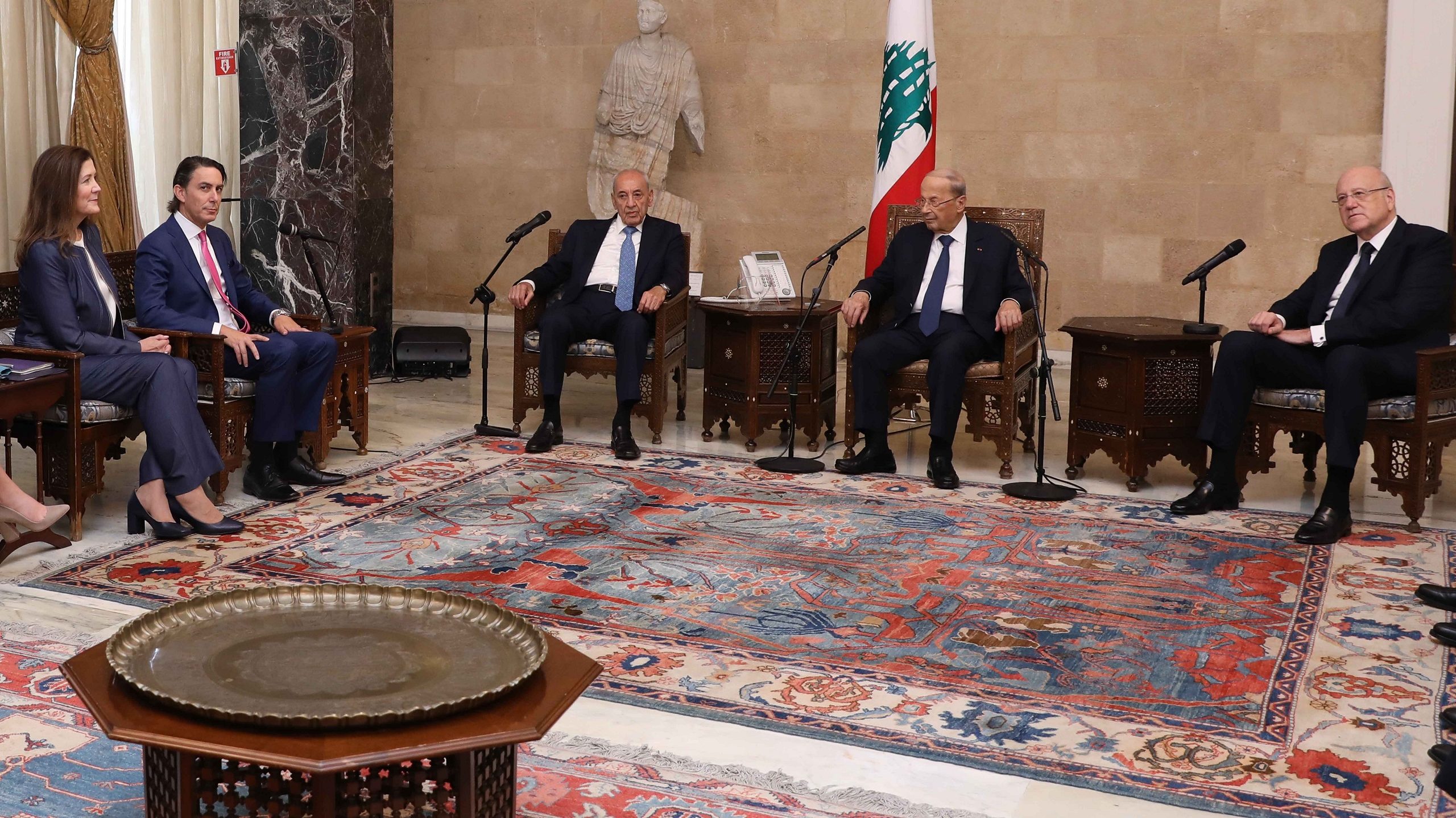Lebanese President Hails ‘Meaningful Progress’ on Maritime Border Dispute With Israel
Experts skeptical whether announcement means deal signing imminent
Lebanese President Michel Aoun announced Wednesday that the maritime border negotiations between Israel and Lebanon have made great progress and only a few technical details are yet to be resolved.
“The results that Lebanon has achieved in negotiations will enable it to invest its oil and gas wealth. We are currently studying some technical details to solve them in a way that would serve the interest of Lebanon, its rights, and sovereignty,” said Aoun.
The announcement comes just a day before the deadline set by Hizbullah chief Hassan Nasrallah in previous speeches for the negotiations to conclude, according to Dr. Barak Bouks, a senior research fellow at The Europa Institute and lecturer at the School of Communications and Department of Political Studies at Bar-Ilan University.
“[Nasrallah] was quoted in one of the Lebanese websites saying that the deadline for finishing the negotiations was September 1, then he corrected himself in another proclamation, and said that the deadline is today, September 15,” Bouks told The Media Line.
Israeli Defense Minister Benny Gantz said at the 21st World Summit on Counter-Terrorism at Reichman University on Thursday morning that “if Nasrallah wants to try and harm and to complicate this process, he is welcome to do so; the price is Lebanon.”
Israel and Lebanon’s long-standing dispute over their maritime border became noteworthy after Israel discovered a huge gas field in the Eastern Mediterranean, which it named the Karish field. US Senior Advisor for Energy Security Amos Hochstein is acting as a mediator in the slow-moving negotiations.
Dr. Ecaterina Matoi, program director at the Middle East Political and Economic Institute in Bucharest, Romania, told The Media Line that it was hard to say, given their track record, whether the negotiators would move forward or not.
“Indeed, this seems to be the communique of the Lebanese president,” Matoi continued, adding that “knowing the military and political past of the current Lebanese president and the reasons why negotiations have stalled so far, I can only say this: Let’s not forget that the devil is in the details, regardless of whether they are technical or not.”
Bar-Ilan’s Bouks added that similar statements coming from President Michel Aoun have been made in the past without an actual agreement being completed afterward, saying that the announcement could mean the Lebanese are working on the negotiations, but they could drag on even for years.
“Aoun tweeted the same, in the same manner, and the same text of ‘the agreement is almost there’ before the Middle East visit of US President Joe Biden in July,” he noted, adding that the agreement signing was also said to be close in 2019.
However, the experts agree that both countries have much to gain by concluding an agreement on their maritime border. Chadi Nachabe, a Lebanese political and economic researcher, told The Media Line that Lebanon’s main motive was economic.
“Lebanon has a financial crisis and needs to have this kind of deal to start the [natural gas] extraction later [to start paying for] its debts. However, immediately after Lebanon agrees to a deal, it will help to get financial support and investors,” he said.
Nachabe noted that Lebanon’s aim in the talks was to reduce its debt and stop the economic crisis. “It is a baseline for Lebanese policy to seek economic prosperity,” he concluded.
Bouks stressed the severity of Lebanon’s economic crisis. “You can define Lebanon as a bankrupt country, meaning that Beirut, which is named the city of light, has no electricity – it has two hours of electricity per day. The Lebanese banks do not release money to citizens who want to withdraw money,” he said.
Drilling for gas could be beneficial for Lebanon’s electricity crisis, the economic crisis, and even more, said Bouks, adding that there are companies ready to operate the projects, but which will not begin operations until the agreement is signed, fearing for the sake of their inversions.
Nachabe pointed out that the Americans also have a reason to promote the negotiations: Europe’s imminent need for gas for the coming winter due to the cut in supply caused by the Russo-Ukrainian War.
Concerning Israel’s motivation, Matoi said, “It is not only about solving the maritime border and implicitly gaining access to those gas fields in the Mediterranean Sea and legally exploiting them, but especially about the vision projected by Theodor Herzl on what the State of Israel should be at a certain period of time in the region.”
Bouks added that, if the negotiations are concluded, “all of the excuses to start a war by Hizbullah will disappear, together with all the fears that Hizbullah is going to attack Israel. Stability will come to this area and all the sides are going to enjoy that.”
He also cited US envoy Amos Hochstein, who arrived in Beirut in July to push the talks to a conclusion. “Reaching a resolution is both necessary and possible, but can only be done through negotiations and diplomacy,” Washington’s envoy said. Referring to potential gas pipelines in the Eastern Mediterranean linking Israel, Cyprus, and Greece, he commented that all of them depend on some sort of an agreement with Lebanon to make sure they are secure.
Matoi pointed out, however, that if the negotiations are really coming to an end, it means one of two things: Either the Lebanese government believes it must reach an agreement due to pressures from its citizenry and its bankrupt economy, or the country has received firm assurances from relevant regional and global powers regarding its internal security as well as economic and financial relief.
He added, however, that the signing of an agreement wouldn’t necessarily mean the immediate flourishing of the Lebanese economy or the improvement of relations with Israel. But he said both things would be possible after both countries start selling gas from the Karish offshore field, to which both countries have claims.


